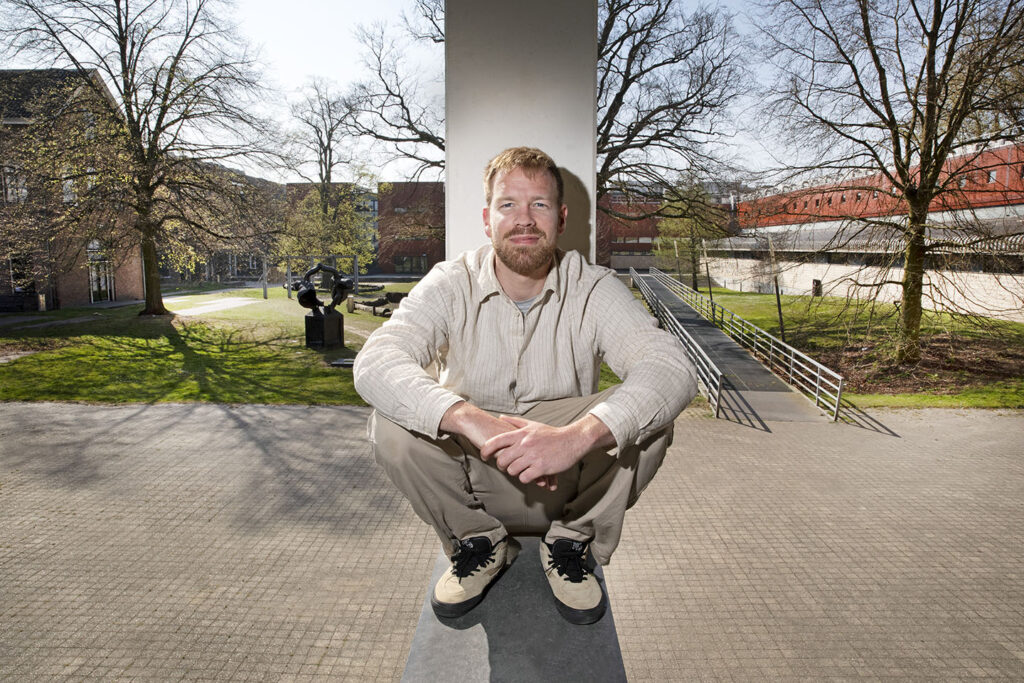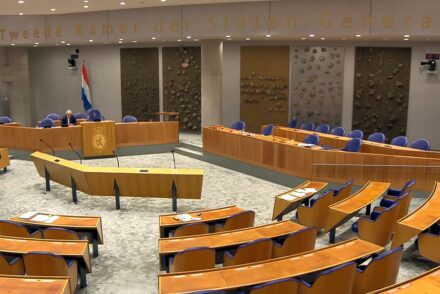Philosopher and comedian Dirk Waterreus: ‘Melancholy and humour are intimately connected’
Dirk Waterreus, a former philosophy student, became entangled in depression and addiction. But he recovered and now chooses a career in comedy with full conviction: ‘When people feel that it is real, the joke really hits.’

It is a warm spring afternoon in the Oude Warande, the forest behind Tilburg University. On a wooden bench, half in the sun, sits Dirk Waterreus. A few years ago he was still studying at Tilburg University, and although his student days brought valuable insights, it was also a period in which he was confronted with addiction and depression. These experiences came between him and the life he tried to understand and feel. ‘I was good at thinking, but not so good at feeling things,’ he says with a laugh in a clear Brabant accent. ‘I could also use thinking to avoid having to feel.’
Now, years later, Dirk has decided to focus entirely on his comedy career. Something he was already doing during his student days. But now he is taking a different approach: no more half measures. Univers speaks to him about the difficult years, his recovery, the beauty of a good joke and why he finally dares to choose the spotlight.
How are you doing?
‘My life looks great at the moment. I feel good about myself. I feel like living and doing things. And yes… that surprises me a little sometimes. It feels like the tectonic plates in me are just right, like everything just happens to come together just right.’
And has that ever been different?
‘That has indeed been different at times.
‘I have been very depressed. How did that feel? Like having a nightmare, thinking you will wake up, but then realizing you are still in it. When it gets too intense, you want to wake up, but you can’t because you are already awake and it is not a dream.’
How did you get over it?
‘I have learned to deal with things better, whether they make me feel good or bad. I have also stopped smoking and I have not had a drop of alcohol for a long time.
‘For me it was really a matter of time, with the right people around me. I had a lot of support from close family members during the period when I was really low. In addition, it helped me a lot to set small goals in order to achieve bigger goals.
‘I have to be honest: I also used antidepressants for a while, about three or four months. At first I thought I could do it myself, that I would manage without help, but after a while I found out that I couldn’t do it alone. I’m not proud of it. Ultimately, I don’t believe that such medication is a real solution.’
Have you ever felt this way before?
‘Actually, the gloomy feeling started earlier. In group 8, I often felt excluded. I wanted to belong with the cool boys, but I was too sensitive, cheerful or clownish for that. On Sundays, I felt melancholic. The transition to Monday felt like an endless sense of time and that gave me a bad feeling.
‘I think that was my first experience with melancholy. But that is also where comedy was born for me, because melancholy, melancholy and humor are closely linked.’
When did it first become clear that there was more going on than just gloom?
‘When I was 19, a psychologist in Nijmegen actually diagnosed me with something: persistent depressive disorder, also known as dysthymia or PDD. From that moment on, it also became easier to fall back into smoking weed. Weed made me feel normal, as if I could breathe again for a moment. I knew it was bad for me, but I felt good about it at that moment.’
Our conversation is interrupted by a sharp sound. A man, a little further away, is blowing a whistle with great enthusiasm. ‘Do we have to do a trick now?’ Dirk asks dryly. ‘No, my dog recognizes this sound and will come right over,’ the man answers. But no four-legged friend comes running to him. ‘Are you sure you have a dog?’ he jokes, after which we resume our conversation.
Why did you study philosophy?
‘During my first philosophy class at secondary school, something special happened. The philosophy teacher started talking and I immediately thought: Huh? Is there really a subject that thinks like me? That touched me deeply. Philosophy immediately felt familiar, as if it was part of me. While I failed almost all subjects, I suddenly got more than enough for philosophy.
‘The fact that I would later study philosophy felt like a logical choice. Yet I have always had a love-hate relationship with the subject. On the one hand, it gave me insights that I have benefited greatly from, on the other hand, I often found it difficult and tiring. In recent years, I have noticed that I enjoy it less. I hardly read philosophy anymore – at most a Donald Duck in the bath. Sometimes I think: a lot of talk, little clarity. If you ask the right questions, people often don’t know exactly what they mean.
‘But for me there is one exception: the Greek philosopher Socrates. He said: The only thing I know is that I know nothing. That is also the title of my new show: The only thing I know… What comes after that, you can fill in yourself. Because that is exactly what it is all about for me.’
What do philosophy and comedy have in common?
‘They are both about something you can never fully control. In philosophy, that is the truth, which keeps changing with new angles. In comedy, it is the audience’s laughter, which you cannot force.
‘Moreover, both philosophy and comedy are about perspective: how do you look at something and how do you tell a story? Both are about creativity, personality and reflection. Everyone thinks about life, death and time in their own way. Moreover, we all laugh, sometimes out of recognition, sometimes out of discomfort, but usually a combination of both.
‘For me, the challenge is to say what I really think on stage. Not only focusing on the joke, but also on the sincerity behind it. Because when people feel that it is real, the joke really hits home.’
What can we expect from your show?
‘In the performance I try to apply the philosophy of Socrates to my own life. At different moments in my life I repeatedly discovered that ‘I didn’t know’. It may sound a bit cliché, but for me it has also become a kind of acceptance: that it is okay not to know.
‘The show consists of personal anecdotes, with my own life quest as a common thread. Sometimes a poem comes along, often something absurd, but the show remains above all an intimate and personal story.’
Curious about Dirk Waterreus and would you like to see him on stage? On July 4th he will play in the BlackBox at the university. He will also be in the semi-finals of the Tilburg Cabaret Festival on May 14th (both are in Dutch)







